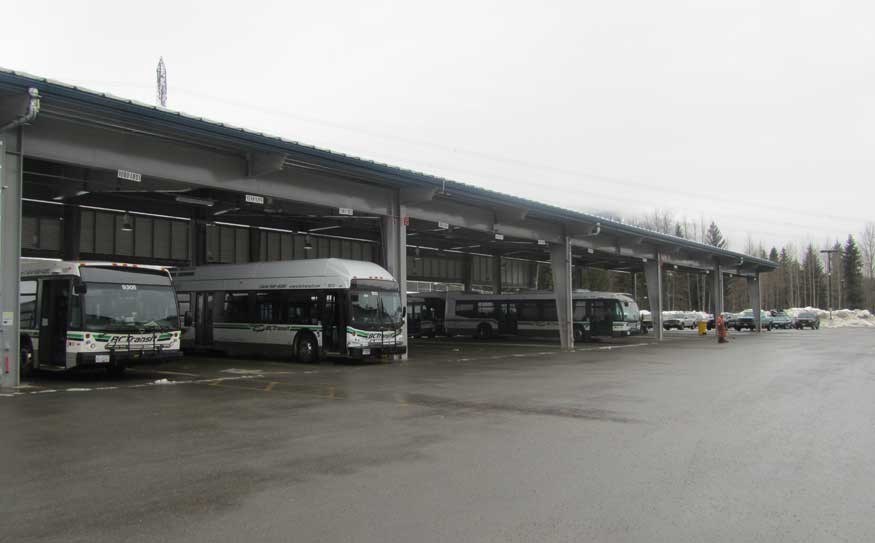BC Transit is at the mercy of Whistler council as it looks to rake in more revenue by getting into private commercial business for the first time in its history.
Plans are in the works to rent out space at the $23 million Whistler Transit Facility, setting the stage for more commercial opportunities for BC Transit not only in Whistler, but also elsewhere in the province.
The decision ultimately rests in council's hands. It must approve a rezoning to allow the commercial opportunity at the site, the first time it will be able to exercise any control or jurisdiction at that facility, dubbed locally as "Garagemahal" for its size and ultimate cost.
Mayor Nancy Wilhelm-Morden said the rezoning, which has yet to come before council, is a chance for council members to ask Transit to address some of the community concerns, such as light pollution from the facility and screening from the highway.
"It's an opportunity for us to ask BC Transit to do some mitigation," agreed the mayor.
Of course, too much "enthusiasm" with requests could push BC Transit away. And it appears at this point that's not something either side wants when looking at the potential to bring in revenue, and ultimately lower the costs of the local transit service, which is shared by BC Transit and the municipality.
The costs skyrocketed in recent years for a variety of reasons; paying down the multi-million facility has been a contributing factor.
Transit has a customer lined up for September 1, interested in renting six covered parking stalls at proposed market rates, with potential net revenue of roughly $33,000 per year.
"This is the first business case that we're pursuing in the province," said BC Transit corporate spokesperson Meribeth Burton.
"We're really hopeful that this will be successful and replicated elsewhere."
The Ministry of Transportation and Infrastructure granted BC Transit an Order in Council to move ahead with a business plan that would allow it to lease space at the Whistler facility to other non-Transit vehicles under a fee-for-service model.
The Whistler hub, built just north of Nesters on the highway before the 2010 Olympics, can hold up to 50 buses.
With a fleet of 23 now serving the community, there's room to branch out.
And parking is just the beginning of the commercial endeavour.
"We have storage and places to park large vehicles and the wash and the diesel fueling station," said Burton. "We have all the amenities that other bus companies would be looking for."
It is not clear how much money could come in with other business opportunities. Municipal CAO Mike Furey said after the council meeting: "It has a lot of potential to grow."
When asked if this is an example of "entrepreneurial government," which earlier in the day during the Official Community Plan workshop the mayor said she did not support as a policy, Wilhelm-Morden said:
"No. And we had a discussion about that because we're looking at bus washing facilities for example and there's no private bus washing facilities out there, nor are there plans for one to our knowledge, so we are not scooping some kind of opportunity that's available for private business."
As for renting the space, she said: "To a certain extent, perhaps we are providing something that a private operator could do, but when we look at the number of buses that are sitting parked in parking lots 4 and 5, they shouldn't be there actually."
The transit facility has been under fire from the get-go over concerns not only about the wetlands it was built on, but also the form and design of the facility itself. Whistler had no control over the facility because it was built on BC Hydro land, another Crown Corporation, and exempt from local zoning.
The Advisory Design Panel notes from March 2009 state:
"(The) Panel felt that the project is inconsistent with the design, form and character of the rest of Whistler, and that a potential long-term eyesore is being created."
Of particular concern for some residents is the impact to the night sky with light pollution from the facility.
A consultant for BC Transit has looked at the lighting at the facility and recommended that shades be put on eight lamp standards closest to the highway at a cost of $200 per lamp, which can be accommodated in this year's budget.
Transit is organizing the installation.




